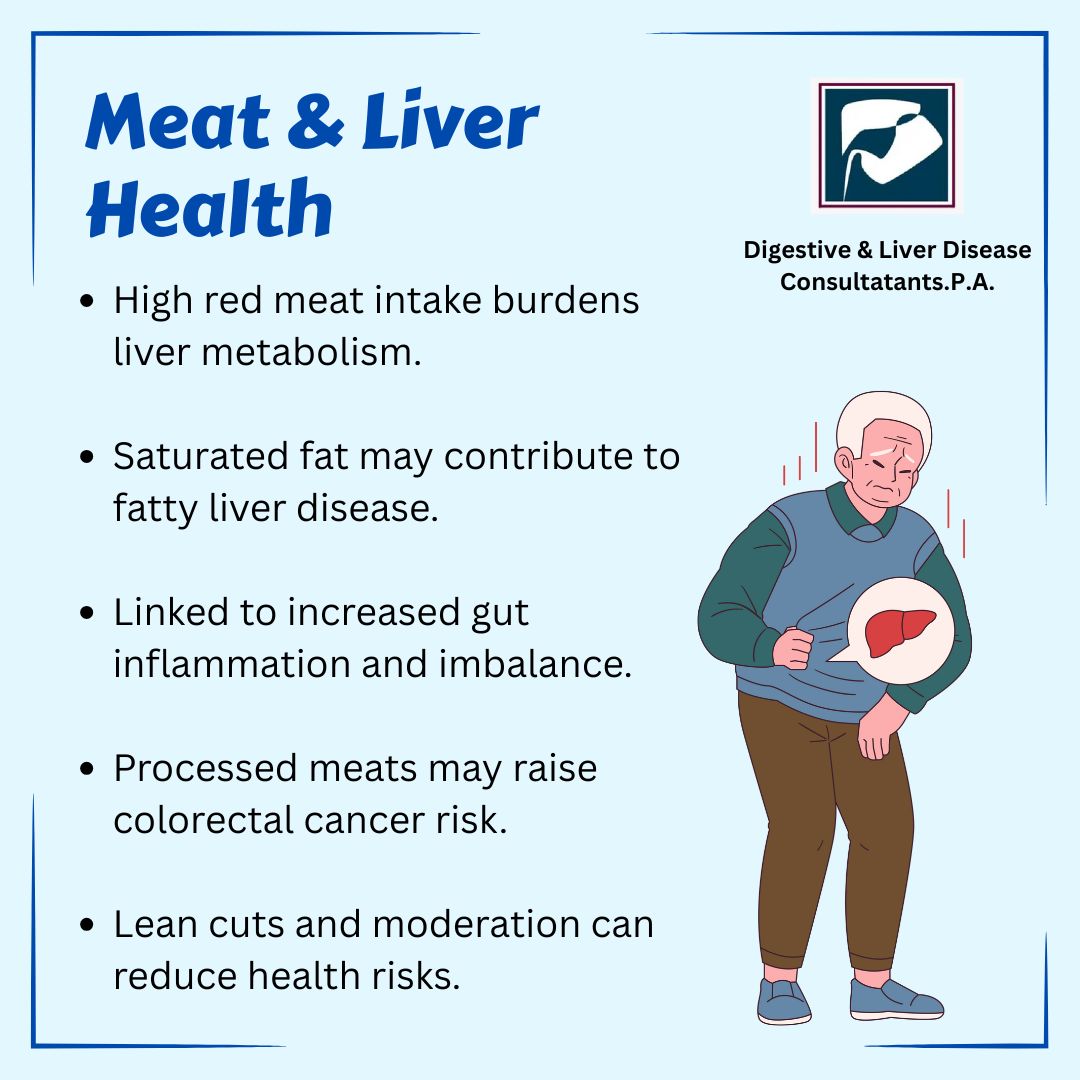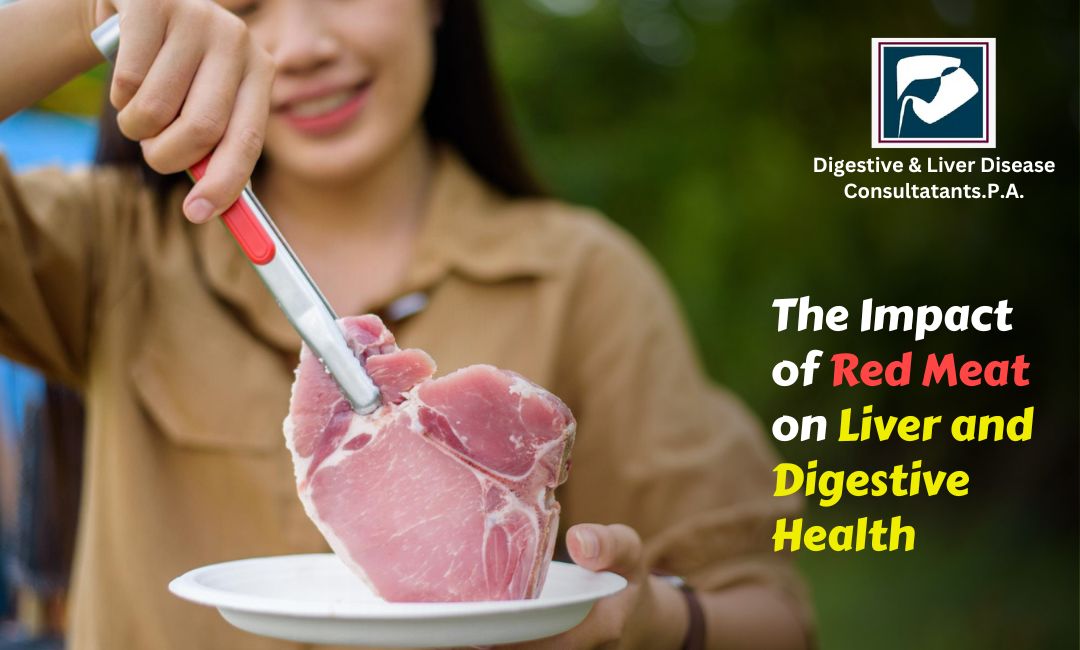Red meat has long been a staple in many diets across the United States. From juicy steaks to sizzling burgers, it's a popular source of protein and iron. However, recent research suggests that high consumption of red meat may negatively affect your liver and digestive system. As liver and digestive health specialists, Digestive & Liver Disease Consultants, P.A. aims to help you understand how red meat can impact your body and what you can do to protect your health.
In this blog, we’ll explore how red meat affects liver function, digestion, inflammation, and overall gut health. We’ll also share practical tips on how to make healthier dietary choices.
Understanding Red Meat and Its Role in the Diet
Red meat includes beef, pork, lamb, and veal. It is rich in protein, vitamin B12, iron, and zinc, which are essential for many body functions. However, red meat—especially processed varieties like sausages, bacon, and hot dogs—also contains saturated fats, cholesterol, and preservatives, which can contribute to various health issues over time.
Red Meat and Liver Health
One of the biggest concerns is the relationship between red meat and liver health. The liver is your body's detox center, and it works hard to process the fats and proteins found in your diet. Consuming high amounts of red meat may overburden the liver, particularly if it’s already compromised.
Is red meat bad for liver?
Studies have shown that diets high in red meat—especially processed types—can increase the risk of non-alcoholic fatty liver disease (NAFLD). This condition occurs when excess fat builds up in liver cells and can lead to inflammation, scarring (cirrhosis), or even liver failure in severe cases.

Red meat and fatty liver
Excess saturated fat from red meat promotes fat accumulation in the liver. This can worsen fatty liver disease and make it harder for your liver to function properly.
High protein liver impact
While your body needs protein, too much—especially from red meat—can increase the liver's workload. Those with existing liver disease should be especially cautious about protein intake.
Red Meat and Digestive Health
The digestive system breaks down food and absorbs nutrients, but not all foods are digested equally. Red meat is harder to digest compared to plant-based proteins and lean meats like chicken or fish.
Red meat digestion challenges
Red meat takes longer to break down in the digestive tract, often causing bloating, gas, and digestive discomfort. It can also lead to constipation due to its lack of dietary fiber.
Digestive problems red meat
People with sensitive stomachs, IBS, or other digestive conditions often report worsening symptoms after eating red meat.
Red meat and bile production
Your liver produces bile, which helps break down fats. Consuming high-fat red meat can overstimulate bile production, potentially leading to gallbladder issues or acid reflux.
The Gut Health Connection
Your gut microbiome plays a crucial role in digestion and immunity. A healthy gut needs a balance of good bacteria.
Red meat and gut health
High consumption of red meat may alter the gut microbiome by encouraging the growth of harmful bacteria. This can contribute to gut inflammation, poor digestion, and even weakened immune function.
Red meat and colon health
Frequent red meat consumption is linked to colon health risks, including inflammation and polyp formation.
Red meat colon cancer risk
The World Health Organization classifies processed red meat as a Group 1 carcinogen, meaning it’s directly linked to colorectal cancer. Regular intake of red or processed meats may increase the risk of colon cancer due to compounds like heme iron, nitrates, and HCAs (heterocyclic amines) formed during cooking.
Red Meat and Inflammation
Red meat inflammation
Diets high in saturated fats and cholesterol, like those heavy in red meat, can trigger chronic inflammation. This kind of low-grade inflammation is a silent contributor to many diseases, including heart disease, liver disease, and IBD (inflammatory bowel disease).
Red meat and cholesterol
Regular consumption of red meat can raise LDL (bad) cholesterol, increasing the risk of fatty liver, cardiovascular disease, and more.
Red Meat: Processed vs. Unprocessed
It’s important to distinguish between unprocessed red meat (like a fresh beef steak) and processed red meat (like sausages or deli meats).
Red meat processed dangers
Processed meats are preserved by smoking, curing, or adding chemicals like nitrates. These additives have been linked to an increased risk of colon cancer, heart disease, and liver inflammation.
How Much Red Meat Is Safe?
Moderation is key. The American Institute for Cancer Research recommends limiting red meat consumption to no more than 18 ounces per week and avoiding processed meats as much as possible.
Healthier Alternatives and Tips
- Opt for lean cuts like sirloin or tenderloin.
- Substitute red meat with plant-based proteins like lentils, beans, tofu, or tempeh.
- Include more fiber-rich vegetables to support digestion.
- Use healthier cooking methods like baking, steaming, or grilling (avoid charring).
- Stay hydrated and maintain regular physical activity.
When to See a Specialist
If you're experiencing digestive discomfort, unexplained fatigue, bloating, or have been diagnosed with fatty liver disease, it may be time to consult a specialist.
About Digestive & Liver Disease Consultants, P.A.
At Digestive & Liver Disease Consultants, P.A., our team of board-certified gastroenterologists and liver specialists is committed to providing expert care tailored to your needs. Located in Texas, we offer advanced diagnostic tools and personalized treatment plans to manage everything from common digestive issues to complex liver conditions. Our focus is on preventive care, early diagnosis, and long-term wellness.
Conclusion
While red meat can be a valuable source of nutrients, excessive or regular consumption—especially of processed types—can pose serious risks to both your liver and digestive health. Being mindful of portion sizes, cooking methods, and overall diet variety can help reduce these risks and support better health outcomes.
Concerned about how your diet might be affecting your liver or digestion?
Our experienced team at Digestive & Liver Disease Consultants, P.A. is here to help.
If you suffer from liver disease, gut inflammation, or digestion issues, book an appointment today and take the first step toward better health.






